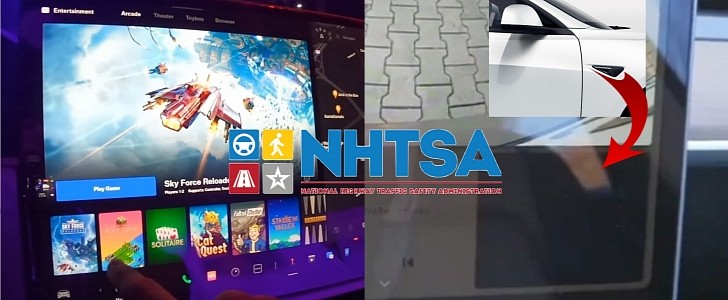A popular saying acknowledges that "talk is cheap." NHTSA (National Highway Traffic Safety Administration) was confronted with that phrase when it said it was discussing with Tesla why it allowed video games to be used when its EVs were moving. That may be why the safety agency raised its tone about the situation and also about replacing repeater cameras as goodwill.
Just for you to remember what we are discussing here, The New York Times recently revealed that Tesla released an OTA (over-the-air) update that allowed anyone in its cars to play “Solitaire,” “Sky Force Reloaded,” and “The Battle of Polytopia: Moonrise” while in movement.
All the driver would have to do to play the video games would be to click on a button saying he’s not the driver. Although that seems incredibly risky and stupid, Tesla vehicles have ADAS systems that people think make their cars autonomous, such as Autopilot and FSD. These folks could want to play video games while “the car is driving itself,” as Tesla said Autopilot did in a 2016 video.
The problem with repeater cameras is that Tesla is replacing them due to defective PCBs (printed circuit boards). When these cameras present issues, Autopilot and FSD operation is affected. Instead of tracking the defect, issuing a recall, and replacing these cameras as warranty repairs, Tesla’s internal service documents state they have to be fixed as “goodwill” for the ones who complain about the issue.
After autoevolution asked the safety agency for more details on how it is dealing with these situations, NHTSA started by saying that “the Vehicle Safety Act prohibits manufacturers from selling vehicles with design defects posing unreasonable risks to safety.”
The agency also said that it is “is empowered with robust enforcement tools to protect the public, to investigate potential safety issues, and act when we find evidence of non-compliance or an unreasonable risk to safety.” That’s a step further than just to say it is “discussing the feature with the manufacturer,” which the safety agency repeated to us when it talked about the issue with the video games.
Despite that, NHTSA said that it “issued guidelines to encourage OEMs to factor safety and driver distraction prevention into their designs and adoption of infotainment devices in vehicles” in 2013. The safety agency also said that it “will continue to work with State and local partners to combat distracted driving, which claimed 3,142 lives in 2019.”
Although that is more cogent than saying it is discussing anything with an automaker accused of offering dangerous features in its vehicles or of not dealing properly with a known defect, it will not change the perception that “talk is cheap.” Action will. We’re waiting for it.
All the driver would have to do to play the video games would be to click on a button saying he’s not the driver. Although that seems incredibly risky and stupid, Tesla vehicles have ADAS systems that people think make their cars autonomous, such as Autopilot and FSD. These folks could want to play video games while “the car is driving itself,” as Tesla said Autopilot did in a 2016 video.
The problem with repeater cameras is that Tesla is replacing them due to defective PCBs (printed circuit boards). When these cameras present issues, Autopilot and FSD operation is affected. Instead of tracking the defect, issuing a recall, and replacing these cameras as warranty repairs, Tesla’s internal service documents state they have to be fixed as “goodwill” for the ones who complain about the issue.
After autoevolution asked the safety agency for more details on how it is dealing with these situations, NHTSA started by saying that “the Vehicle Safety Act prohibits manufacturers from selling vehicles with design defects posing unreasonable risks to safety.”
The agency also said that it is “is empowered with robust enforcement tools to protect the public, to investigate potential safety issues, and act when we find evidence of non-compliance or an unreasonable risk to safety.” That’s a step further than just to say it is “discussing the feature with the manufacturer,” which the safety agency repeated to us when it talked about the issue with the video games.
Despite that, NHTSA said that it “issued guidelines to encourage OEMs to factor safety and driver distraction prevention into their designs and adoption of infotainment devices in vehicles” in 2013. The safety agency also said that it “will continue to work with State and local partners to combat distracted driving, which claimed 3,142 lives in 2019.”
Although that is more cogent than saying it is discussing anything with an automaker accused of offering dangerous features in its vehicles or of not dealing properly with a known defect, it will not change the perception that “talk is cheap.” Action will. We’re waiting for it.








